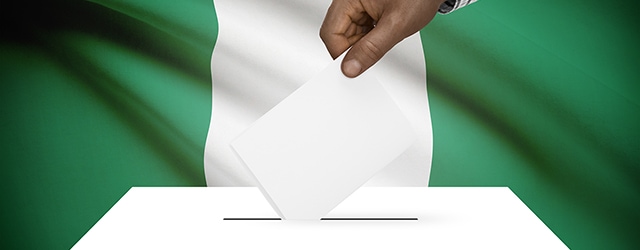Poverty in Nigeria is growing and two presidential candidates have vastly different approaches to tackling the country's problems.

Nigerians go to the polls on Saturday February 23 to elect a president and members of the National Assembly, following the election’s rescheduling by a week by the electoral authority. But voters facea tough choice for who should be the next president:roughly 70 candidates are vying for the position.The top two contenders for the job are the incumbent, President Muhammadu Buhari, andformer Vice PresidentAtiku Abubakar.
Buhari’s ruling All Progressives Congress has implemented populist policies such as feeding students in public schools, Tradermoni, a programunder which the federal government hands out about 10,000 naira ($1=360 naira) to small traders as economic empowerment.
The government has also directed investment to rebuild the nation’s decrepit infrastructureand to fighting corruption, which Buhari claimsis responsible for the country’s stunted progress.
Atiku of the People’s Democratic Partysays his preference is to have the private sector drive growth toget the economy “working again.” He says the economy has suffered due to government mismanagement over the past four years, citing such economic indices as unemployment that rose to 23.1% at the end of the third quarter of 2018, up from 8.2% four years ago, according to data released by the National Bureau of Statistics. He is promising to privatize inefficient state-owned enterprises, including the Nigerian National Petroleum Corp.
The Brookings Institute also said last year that Nigeria had become the world capital of poverty, with 87 million of its estimated 198 million living in extreme poverty. The number has grown since then.
Razaq Ahmed, co-founder of Lagos-basedfintech company CowryWise,says the choice facing Nigerians on Saturdaybetween Buhari and Atiku amounts to“continuity and hope” versus“freshness and uncertainty,” respectively.
Ahmed admits that there are economic challenges, for instance unemployment, which stood at 23.1% at the end of the third quarter of 2018, according to the National Bureau of Statistics. “Unemployment is a messy situation,” he says. Many young people do not have jobs, and he blames this in part on government policies that hamper companies from operating optimally. These include slow company registration procedures, duplicatetaxation, and a deficit in infrastructure, including electricity.
Johnson Chukwu, chief executive officer of Lagos-based Cowry Asset Management Limited,notes that the future ofNigeria’s federal structure will likely effect the election outcome. Many people see Nigeria’s current federal structure as concentrating too much political and economic power at the center, and called fordevolution of powers to state governments.
The two leading candidates differ on this issue significantly. President Buhari said that Nigeria’s challenges are not due to the country’s structure, but “processes.” He believes that cracking down on corruption and implementing good governance will address the problems plaguing Africa’s most populous country.
Atiku says he will restructure the country’s political system within the first six months of his presidency. On this point, he has a lot of support from most of the states in the southeast, the oil-producing Niger Delta region, and the central region and some elements in the southwest.
Proponents of restructuring argue that Nigeria should practice fiscal federalism where regions or states should have control over resources in their domains and pay taxes to the central government. At present, the federal government owns all resources, including oil and gas found mainly in the Niger Delta region. All revenues accruing from oil go to the central purse, from where payments are made to the federating units.
In a country sharply divided along ethnic and religious lines, there are also worries that sectarian sentiments could influence voting behavior. However, both Buhari and Atiku are Muslimsfrom the north and Fulani by tribe,so perhaps such tensions will remain muted no matter who wins the election.



